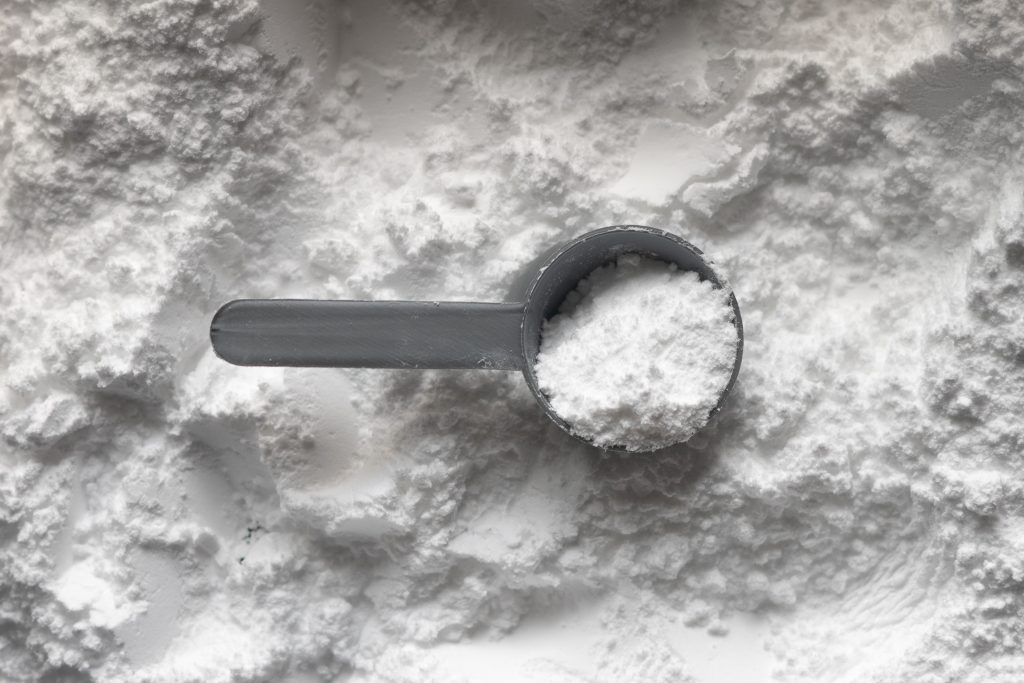Creatine is considered an essential supplement among athletes and bodybuilders. But, is it actually healthy?
Creatine is a supplement that has been gaining popularity over the past several decades. Butwhat is creatine, anyways?
Is it a supplement for just athletes? Should the general population be using it? What does creatine do?
These are all questions we’ll be answering in this article.
What Is Creatine?
Phosphorylcreatine (PCr) and creatine kinase (CK) have been in the spotlight ever since their discovery in 1927 and 1934. And now, creatine is emerging—with a series of promising discoveries having been made.
Creatine (Cr) is the Greek word for flesh, kreas. Cr plays an important role in meeting the energy demands in skeletal or cardiac muscle, brain, retina, and spermatozoa. This works when creatine—a natural substance—turns into creatine phosphate in the body. Creatine phosphate then makes a substance called adenosine triphosphate (ATP). So, technically, ATP is what provides the energy muscles need to contact (1) (2).
What Does Creatine Do?
So, we now know that creatine is the substance that helps our muscles contract. But what other creatine benefits are there?
1. Improves Athletic Performance
You may now be wondering, “Should I take creatine before or after a workout?”
Out of all the creatine benefits, this one is probably the most well-researched.
There have been numerous studies showing the correlation between creatine and the building of lean muscle mass and/or an improvement in “quick burst” athletic performance (3).
The results are in: in a meta-analysis involving 357 older adults, the combination of creatine and resistance training increased total body mass and fat-free mass, with no effect on fat mass as compared with resistance training alone. Chest press increased (P = 0.0004), leg press increased (P = 0.02), and improved the 30-second chair stand test (4).
This shows that creatine may be very beneficial in the healthy aging of adults.
2. Speeds Up Muscle Growth
If you’re wondering, “How much creatine should I take?”, it appears to be that the quickest method of increasing muscle creatine stores appears to be to consume ~0.3 grams/kg/day of creatine monohydrate for at least 3 days followed by 3-5 g/day thereafter to maintain elevated stores.
The energy supplied to rephosphorylate adenosine triphosphate (ADP) to adenosine triphosphate (ATP) during and following intense exercise is largely dependent on the amount of phosphocreatine (PCr) stored in the muscle. In short, without PCr, your body wouldn’t be able to produce ATP. And without ATP, your muscles wouldn’t have the energy to contract (5).
3. May Improve Brain Function
Although the data is limited, creatine appears to have benefits on brain function and cognitive processing.
Creatine is of most benefit when cognitive processes are stressed—in time of sleep deprivation or inadequate oxygen, or during the performance of more complex, cognitive-demanding tasks. It may also reduce the severity of post-traumatic brain injury (6).
4. Potential Anti-Cancer Agent
In an experiment with 256 tumor-bearing rats, they received 300 mg/kg body weight/day for 40 days. The result showed that creatine slows tumor growth without affecting the overall survival rate (7).
5. May Help with Parkinson’s Disease
Creatine already demonstrates neuroprotective effects, so it makes sense as to why it may curb Parkinson’s disease (PD)—one of the most common neurodegenerative disorders and mitochondrial dysfunction.
The National Institute of Neurological Disorders and Stroke selected creatine as a possible disease-modifying agent for PD. Thus, there are many clinical trials now evaluating the efficacy of creatine for patients with PD (8). However, the results remain inconclusive. Two randomized clinical trials included a total of 194 patients, yet there was no clear sign of an effect on motor function, activities of daily living, or quality of life after one or two years of treatment (9).
Final Thoughts: Should I Take Creatine?
With the benefits of creatine comes the side effects as well.
Some athletes have reported muscle cramps and gastrointestinal issues during creatine supplementation, but we can’t be sure that these incidences are linked to creatine itself. Even for those who have taken creatine for several months, liver and kidneys showed no change in functionality among healthy people—both young and old.
However, a French Sanitary Agency (AFSSA) claimed that there could be potential effects of mutagenicity and carcinogenicity related to creatine supplementation (10). In addition to that, creatine is not regulated by the Food and Drug Administration either. With that being said, it’s important to monitor how you’re feeling if and when you do take creatine supplements.
References
- Creatine and Creatinine Metabolism | Physiological Reviews
- https://www.webmd.com/men/creatine#1
- Creatine Use in Sports
- Creatine supplementation during resistance training in older adults-a meta-analysis
- International Society of Sports Nutrition position stand: creatine supplementation and exercise
- Beyond muscle: the effects of creatine supplementation on brain creatine, cognitive processing, and traumatic brain injury
- Exploratory studies of the potential anti-cancer effects of creatine
- Meta-Analysis of Creatine for Neuroprotection Against Parkinson’s Disease
- Creatine for Parkinson’s disease
- Studies on the safety of creatine supplementation


